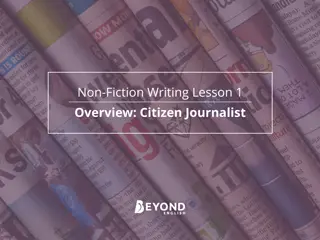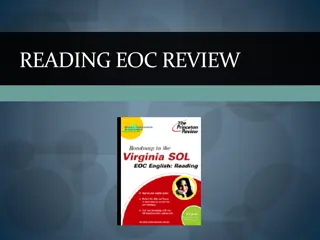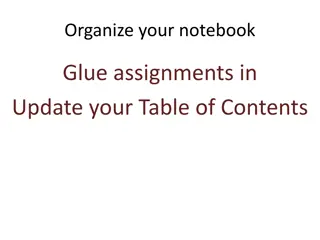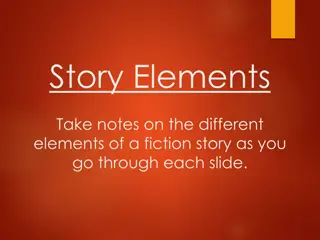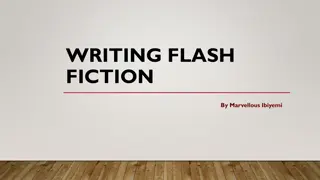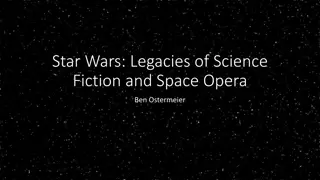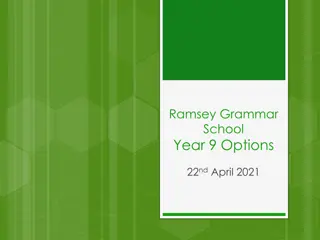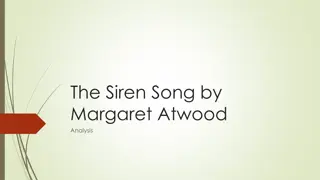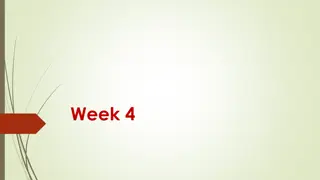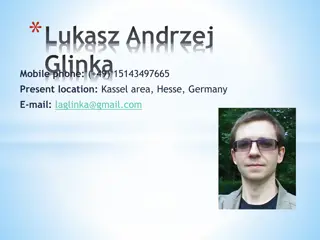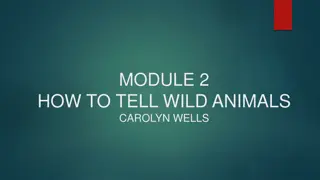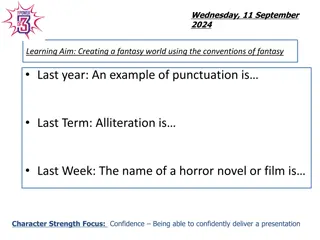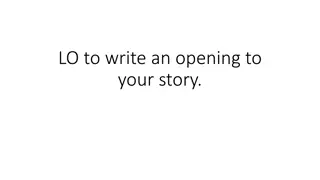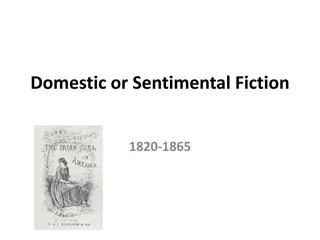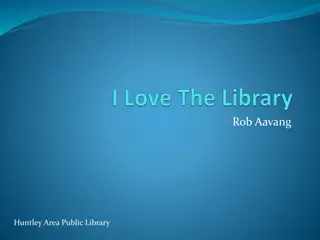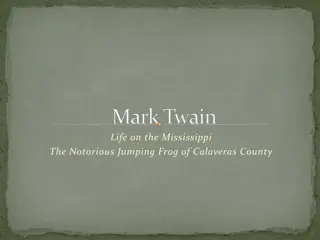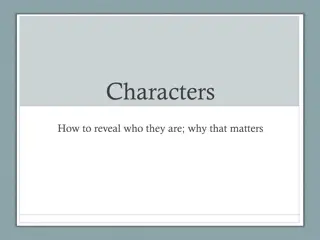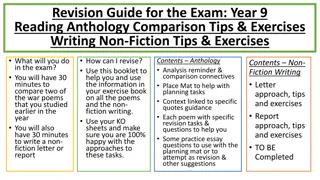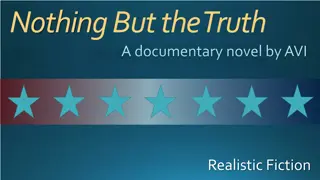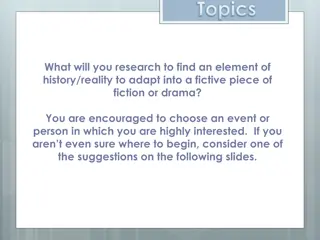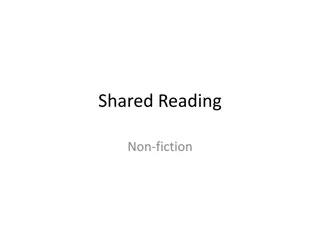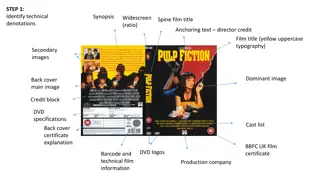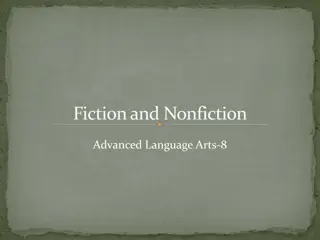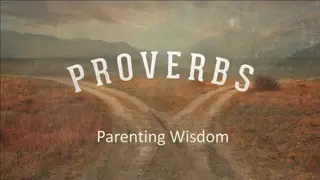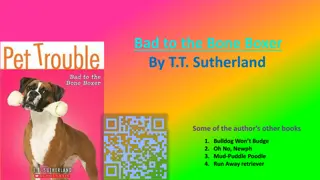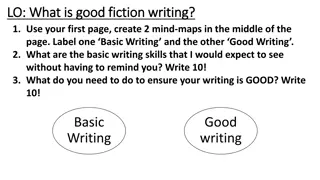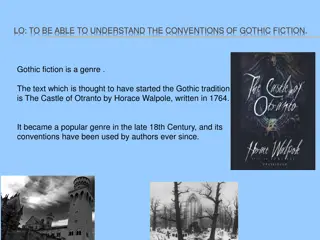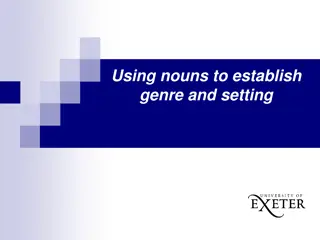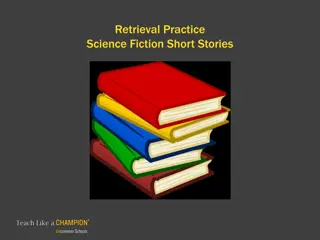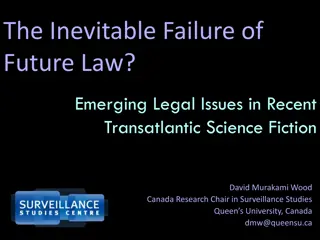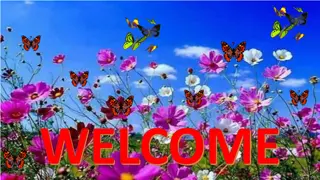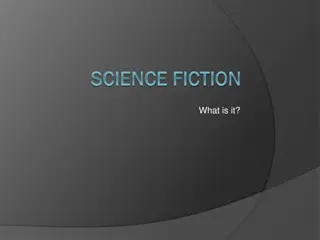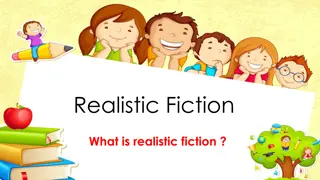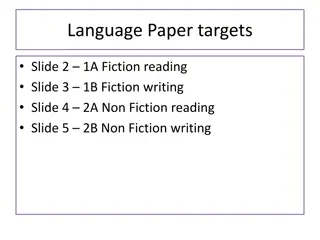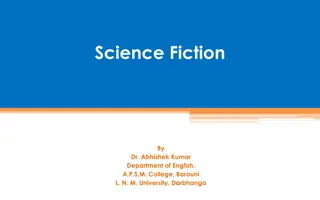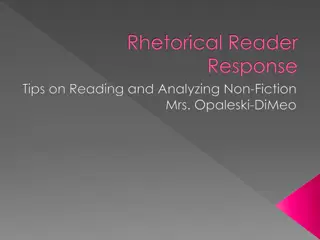Citizen Journalism and Non-Fiction Writing
Explore the world of citizen journalism and non-fiction writing, learning about text types, adapting writing to conventions, considering audience, purpose, and tone. Discover the significance and usefulness of non-fiction writing, and delve into creating various text types. Uncover the role of citiz
2 views • 11 slides
Reading EOC Review: Test Structure, Types of Selections, and Breakdown
The Reading EOC Review covers the test makeup, types of reading selections, and breakdown of questions and content to help you prepare effectively. The test comprises sections with 55 scored questions to be answered, focusing on functional literacy and narrative/fiction elements, including poetry, p
8 views • 26 slides
Historical Fiction: Elements and Examples
Discover the essence of historical fiction, its key elements, and examples like "Forrest Gump." Learn how plausibility and interpretation play pivotal roles in creating captivating narratives that blend fiction with historical events.
1 views • 11 slides
Spring 2015 English 110 Final Exam Information
Spring 2015 English 110 Final Exam includes an Essay Final Exam to be completed by May 21st and an Objective Final Exam on May 27th or May 28th. The Essay Final consists of flash fiction tasks, literary criticisms, and analysis, while the Objective Final covers fiction elements identification and an
0 views • 7 slides
Essential Elements of Fiction Storytelling
Dive into the key components that make up a compelling fiction story, including plot development, setting, mood creation, character conflicts, and the use of imagery and dialogue to enhance the reader's experience. Explore these foundational elements to enhance your storytelling skills.
2 views • 36 slides
Crafting Compelling Flash Fiction: Techniques and Examples
Dive into the world of flash fiction with this informative piece detailing the essence, types, and techniques of writing succinct yet gripping stories. Learn how to hook readers from the start, use impactful scenes over summaries, and create lasting impressions with minimal words.
0 views • 18 slides
Influential Works in Science Fiction and Space Opera Literature
Explore the significant influence of classic science fiction novels like "War of the Worlds," "A Fighting Man of Mars," "Second Foundation," "2001: A Space Odyssey," and "Children of Dune" on the creation of iconic space opera narratives such as Star Wars. Delve into the themes, settings, and charac
0 views • 16 slides
English Language Cambridge IGCSE Course Overview
Students of the Ramsey Grammar School Year 9 English Language Cambridge IGCSE course will engage in reading and analyzing various fiction and non-fiction texts, honing comprehension skills, crafting written pieces with clarity and purpose, and enhancing their ability to summarize and re-imagine cont
1 views • 7 slides
Margaret Atwood's Analysis of "The Siren Song
Margaret Atwood, a renowned Canadian author, delves into the plight of humans through speculative fiction with elements of dystopia and science-fiction. She is an environmentalist who addresses issues like global warming in her works. Atwood's writing style includes free verse poetry with enjambment
16 views • 18 slides
Analyzing Story Structure and Point of View in A Package for Mrs. Jewls
In "A Package for Mrs. Jewls" by Louis Sachar, students explore the elements of humorous fiction through funny characters, dialogue, and unexpected plot resolutions. The story's structure, including setting, characters, conflict, and resolution, is analyzed using reading strategies like visualizatio
1 views • 24 slides
Lukasz Andrzej Glinka - Non-fiction Writer and Science Author with a Diverse Academic Background
Lukasz Andrzej Glinka is a prolific non-fiction writer and science author known for his extensive publication record, academic achievements, and editorial contributions. With a background in theoretical physics and a wealth of experience at prestigious research institutions worldwide, he has establi
0 views • 6 slides
Humorous Techniques in Carolyn Wells' Poem on Wild Animals
The poem by Carolyn Wells humorously depicts the characteristics of wild animals, treating even ferocious beasts with a coat of gentle but weird humor. Through witty language and ironic twists, the poetess describes the different wild animals and their dangerous behaviors, highlighting the risks of
0 views • 12 slides
Ernest Hemingway: A Brief Overview of His Life and Works
Ernest Miller Hemingway, born on July 21, 1899, was a renowned American novelist, short story writer, and journalist who left a significant mark on 20th-century fiction. Hemingway's distinct writing style and adventurous life influenced many generations. He produced numerous iconic works, including
0 views • 20 slides
Fantasy Worlds: Conventions, Types, and Challenges
Dive into the realm of fantasy literature and learn about the conventions, types, and differences between fantasy and sci-fi. Uncover the definition of fantasy, explore popular genres, and discover sub-genres like fiction, science fiction, and historical fiction. Engage in thought-provoking challeng
0 views • 17 slides
Washington Irving: Father of American Fiction and Pioneer of American Romanticism
Washington Irving, an influential American author of the early 19th century, is revered as the Father of American fiction. Known for iconic works like "The Legend of Sleepy Hollow" and "Rip Van Winkle," Irving played a crucial role in establishing American literature as an independent art form. His
1 views • 14 slides
Mysterious Encounters: Science Fiction Stories
As the sun sets, strange occurrences unfold in different worlds - from encountering aliens in a forest to a console explosion in an empire facing an energy crisis. Journey into the realms of science fiction with intriguing characters, futuristic settings, and unexpected dilemmas that will keep you h
0 views • 14 slides
Exploring the World of Domestic and Sentimental Fiction (1820-1865)
Discover the world of domestic and sentimental fiction that captivated women during the 19th century in America. Dive into the plots, characters, and themes that defined this influential genre, exploring the journey of young heroines facing trials, triumphs, and the importance of self-mastery.
0 views • 15 slides
Rob Aavang Huntley Area Public Library Review and Rating
Reasons to love the library include books, movies, online resources, great staff, and computer classes. The individual expresses their feelings at the library and how they feel when leaving. They typically check out non-fiction books, movies, and fiction. Two ratings are provided for customer servic
0 views • 8 slides
Mark Twain's Humorous Tales and Regionalism in American Literature
Mark Twain, a master of humor and regionalism, depicted American culture in a distinctive way through his works such as "The Notorious Jumping Frog of Calaveras County" and "Life on the Mississippi." His stories showcase exaggerated characters, humorous situations, and unique dialects, reflecting th
0 views • 8 slides
Unveiling Character Depth in Fiction Writing
Discover the essence of character development in fiction writing through revealing dialogues, appearance cues, actions, and critical decision-making moments. Dive into how characters come alive through thought-provoking narratives, adding layers of intrigue and authenticity to your storytelling.
0 views • 8 slides
Year 9 Reading Exam Revision Guide: Anthology Comparison & Non-Fiction Writing Tips
This guide is for Year 9 students preparing for their reading exam, covering tips and exercises for comparing war poems and writing non-fiction letters/reports. It includes analysis reminders, comparison connectives, context guidance, specific revision tasks for each poem, and practice essay questio
0 views • 10 slides
Nothing But the Truth: A Documentary Novel by AVI
A realistic fiction novel, "Nothing But the Truth" by AVI, delves into the themes of responsibility, rumors, media influence, and the elements of fiction. Through a documentary-style approach, it explores the dynamics among students, teachers, schools, and the complexity of truth in society, sheddin
0 views • 21 slides
Historical Trials Reimagined: From Fact to Fiction
Explore how real-life American trials, tragedies, and disasters have inspired works of fiction, delving into the creative transformation of historical events into captivating narratives that resonate with audiences. From the Salem Witch Trials to the Civil War era and modern tragedies like 9/11, wit
0 views • 12 slides
Effective Strategies for Shared Reading in Non-Fiction Settings
Shared reading in non-fiction is an effective approach to reinforce literacy skills while teaching subject-specific content. Teachers choose texts that match students' reading levels, are cross-curricular, and engaging. Discussions, predictions, vocabulary exploration, and historical context are int
0 views • 22 slides
Analyzing DVD Cover Design Elements for Pulp Fiction
Identifying technical denotations and developing connotations from the DVD cover of Pulp Fiction, focusing on elements like the spine details, synopsis, anchoring text, dominant images, and cast list to understand the design choices and intended messages.
0 views • 6 slides
Fiction and Nonfiction in Language Arts
Fiction and nonfiction are two key genres in literature. Fiction involves imaginative storytelling with elements like plot, characters, setting, point of view, and theme. Nonfiction, on the other hand, deals with real people, events, and ideas, aiming to inform, persuade, or entertain readers. Explo
0 views • 14 slides
Insights and Reflections on Parenting: Words of Wisdom and Guidance
Discover profound reflections on parenting through a collection of quotes and verses from various sources. Explore the humorous, challenging, and enlightening aspects of raising children, emphasizing the responsibility and privilege it entails. Uncover perspectives on nurturing the next generation a
0 views • 45 slides
Bad to the Bone Boxer by T.T. Sutherland
Are you an animal lover? Then read "Bad to the Bone Boxer"! This realistic fiction book follows the story of two friends, Michelle and Rosie, and Michelle's boxer dog, Tombo. The book explores their friendships, conflicts, and adventures, offering a mix of tragedy and comedy that will keep you enter
0 views • 5 slides
Enhancing Fiction Writing Skills Through Practice
This comprehensive guide outlines the fundamentals of good fiction writing, from basic skills to advanced techniques. It delves into the importance of vocabulary, structure, and grammar in creating compelling narratives. Readers are encouraged to enrich their writing with sophisticated vocabulary an
0 views • 4 slides
Gothic Fiction Conventions in Literature
Gothic fiction is a captivating genre rooted in dark, mysterious settings, supernatural elements, and eerie atmospheres. Originating with "The Castle of Otranto" by Horace Walpole, this genre has evolved to encompass elements like family curses, isolated castles, and sinister creatures. Dive into th
0 views • 25 slides
Creative Noun Usage in Science Fiction Writing
Explore the art of using nouns to establish genre, setting, and character names in science fiction writing. Learn how authors like Philip Reeve utilize proper nouns to create immersive worlds and unique characters. Delve into the significance of authentic text, discussion, and purposeful learning pr
0 views • 10 slides
Science Fiction Retrieval Practice: Short Stories Insights
Explore futuristic technologies, incongruity, and speculative fiction elements in science fiction short stories like "Robbie" and "There Will Come Soft Rains." Uncover the connections to historical events, like the Cold War, through literary analysis of these captivating narratives.
0 views • 16 slides
Legal Themes in Science Fiction: The Inevitable Failure of Future Law
This study delves into emerging legal issues in recent transatlantic science fiction works by authors like Charles Stross, Ken McLeod, and Paolo Bacigalupi. It examines the portrayal of law in SF and what insights it offers about our legal systems. Through a systematic survey of over 300 novels and
0 views • 12 slides
The Luncheon by William Somerset Maugham: A Humorous Encounter
In 'The Luncheon,' a humorous short story by William Somerset Maugham, a writer recalls a lavish lunch he hosted for a lady admirer at an expensive Paris restaurant. Despite his financial constraints, he agrees, leading to amusing consequences. The story beautifully captures human nature with humor
0 views • 10 slides
Exploring the World of Science Fiction
Science fiction is a genre that delves into imagined future scientific and technological advances, exploring major societal and environmental changes, space travel, time travel, and life on other planets. It combines elements of science and fiction to create believable yet captivating narratives tha
0 views • 14 slides
Realistic Fiction: Features and Examples
Realistic fiction is a genre of writing that portrays characters, settings, and events that could exist in real life, even though the story itself may be fictional. The key features include believable characters, realistic settings, everyday problems, and plausible solutions. By sorting book covers
0 views • 9 slides
Language Paper Targets for Fiction and Non-Fiction Reading and Writing
This content provides detailed targets for Language Papers, focusing on Fiction and Non-Fiction reading and writing skills. It covers strategies such as being specific in analysis, using evidence from texts, improving sentence structures, enhancing vocabulary usage, and applying language techniques
0 views • 14 slides
Evolution of Science Fiction Literature
Science fiction genre, blending imaginative fantasy with scientific principles, has evolved significantly over time. Initially emerging in the late 1800s, it gained popularity alongside technological advancements. Theodore Sturgeon highlighted the essence of human stories within the genre. Iconic wo
0 views • 8 slides
Effective College Reading and Analysis Strategies for Non-Fiction Texts
Enhance your non-fiction reading and analysis skills with these practical tips: prepare yourself mentally before reading, preview the article, highlight key points while reading, monitor comprehension, and summarize the article afterward. Additionally, learn how to create a rhetorical précis to eff
0 views • 19 slides
Fictional Genres: Mystery, Historical, and More
Dive into the captivating world of fiction with its various genres like Mystery, Historical fiction, Realistic fiction, Science fiction, Folk tales, Myth, and Fairy tales. Discover how these genres transport you to different realms, from unraveling mysteries to exploring imagined pasts and futures f
0 views • 13 slides
